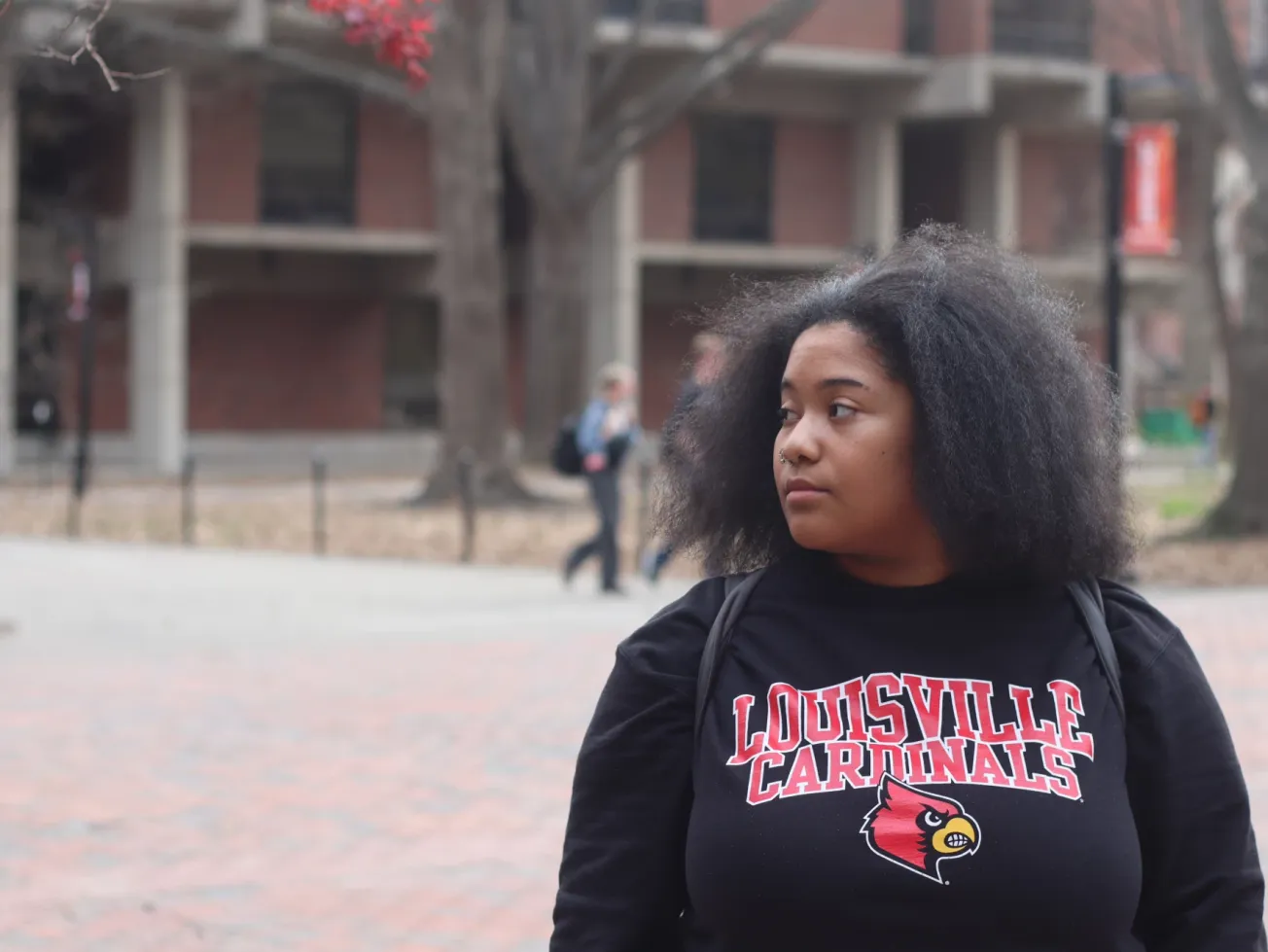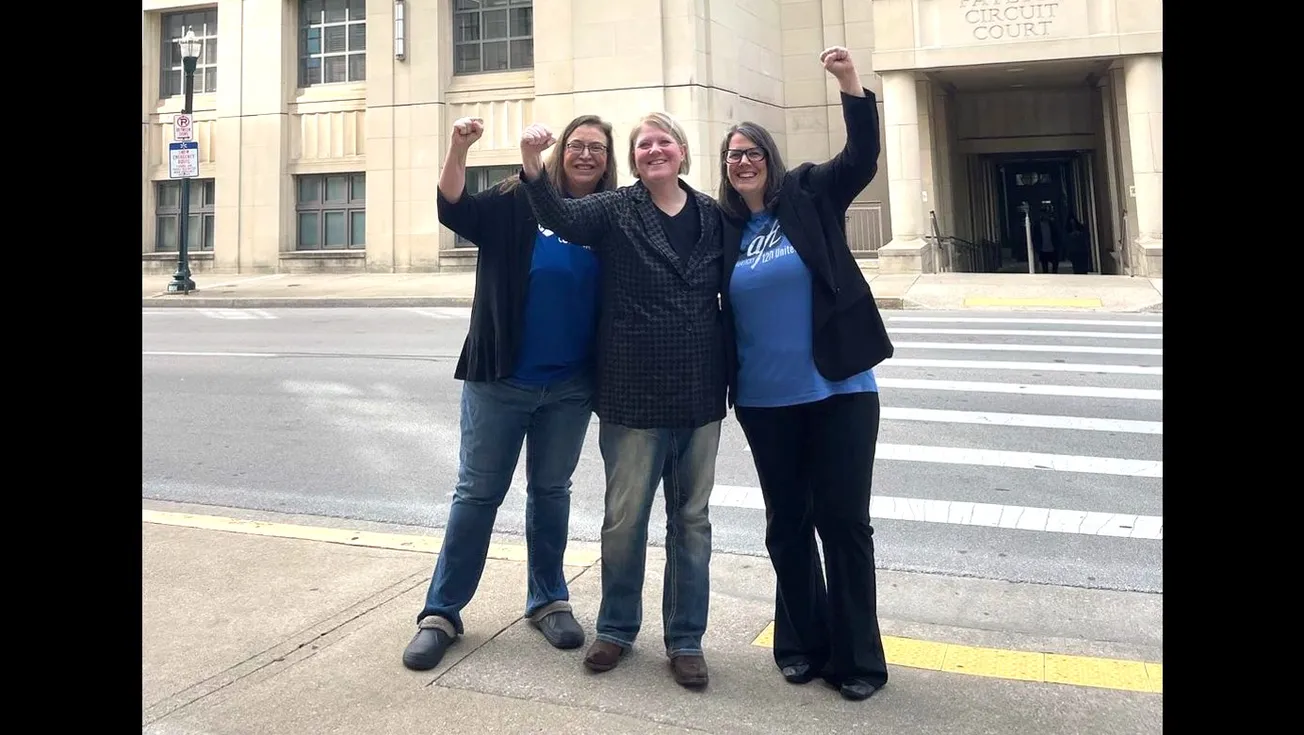In the weeks leading up to a committee vote on a bill that would dismantle diversity, equity and inclusion offices at public colleges across Kentucky, Michael Frazier went looking for feedback and support from students.
Frazier met University of Louisville student Rebekah Flowers on that tour and asked her to write a letter about her experience with DEI on her campus. Flowers says she agreed to provide feedback anonymously.
Though she had complaints about some of the DEI offices on campus, Flowers said she opposes efforts to dismantle DEI and hoped her words would reduce the harm the bill would have on students like her, Flowers told Kentucky Public Radio.
Instead, she says Frazier used her name publicly against her wishes, and inserted a line in her letter insinuating her support for parts of the legislation while testifying to lawmakers.
Hers was the only testimony from a person of color allegedly in favor of the legislation at the March committee hearing. Flowers said she was shocked to hear Frazier say her name at the hearing and then put words in her mouth.
“It was kind of discouraging. I feel like going into this space, as a student, and I'm already feeling a little weird,” Flowers said. “I felt like I wouldn't have been taken advantage of in that way. And so it left a sour taste in my mouth of feelings of distrust.”
KPR reviewed text messages and emails supporting that Frazier publicly used her name against her wishes, though he said it was unintentional in texts to Flowers. Frazier has since told KPR he believed he had permission to use Flowers’ name.
KPR also reviewed both the hearing and copies of Flowers’ statement. Frazier inserted an additional sentence in the midst of reading her statement, while under oath — the only mention of the legislation in the statement.
“I read her letter in full, including that she does support diversity, equity and inclusion,” Frazier said.
Frazier is a lobbyist for Ban Conversion Therapy and often speaks on First Amendment rights issues before the legislature. He has also been heavily involved with the anti-DEI legislation, testifying at the same table as Republican Rep. Jennifer Decker of Waddy, who carried the bill in the House, before a committee vote. However, Frazier says he did not support the legislation in his capacity at a lobbyist.
Frazier said he believed Flowers to be in support of “tenets of the bill,” if not the bill itself. He did not think it was misleading to either add a sentence or to use her statement in the portion of the testimony expressly set aside for supporters of the legislation, he said.
He told KPR he believed the statement accurately reflected Flowers’ views and the fact that he looked up from Flowers’ statement in order to say the added sentence implied it was ad-libbed.
Frazier also changed the original statement, adding a line at the top addressing it to the committee and another at the bottom to include Flowers’ name and campus positions. He said he believes Flowers was compelled to change her opinion about the bill after “an amazing amount of pressure” from the student body and DEI officers.
Flowers denies that allegation. Her mother, Nicole Flowers, said she believes her daughter was used as “a pawn” for political ends.
“Her character was questioned,” Nicole Flowers said. “It takes a long time to build and moments to destroy.”
‘I was told I was making a difference’
Senate Bill 6, in its current form, would ban all DEI initiatives, offices and positions at public colleges in Kentucky. It would not allow any academic programs to require courses that include DEI. It would ban any scholarships that give preference on the basis of race, national origin or sex.
It’s part of a wave of conservative legislation across the country condemning diversity, equity and inclusion efforts as divisive and discriminatory against right-wing faculty and students. Just last week, Alabama’s governor signed a similar ban into law.
Rebekah Flowers was first approached by Frazier a few weeks ago, when he did a tour of campuses to talk about the anti-DEI bill he was pushing, she said. Flowers is a University of Louisville student, a Martin Luther King Jr. scholar, a member of the Student Government Association and a Black woman.
She was in a glass blowing class when she found out that Frazier had misrepresented her words, and publicly named her.
“I'm having a great time. And then I get a text,” Flowers said.
In polite terms, the friend told her that people were upset — how could she suddenly support anti-DEI legislation?
“I immediately put down the [glass blowing tool]… and I called the person that texted me that and I was like, ‘What do you mean?’” Flowers said. “I never wrote a statement in support of SB 6.”
Under oath, Frazier told the House Education committee that Flowers was “unable to join us” for the hearing — Flowers said she communicated she wouldn't be attending and planned to remain anonymous.
Then, in the middle of delivering Flowers’ statement, Frazier inserted a single sentence. It referenced concerns that cultural resource centers would lose funding.
“I'm glad to see that in SB 6 in the Senate substitute, this is not true,” Frazier said without pause in the midst of reading Flowers’ statement.
The statement Flowers provided does not include that sentence. Nor does it include any reference to SB 6. Flowers said the added statement implied she was in favor of the bill or glad that it was being brought forward — neither of which are true. If she ever said such a thing, it was because she was glad the bill was slightly better than the worst scenario, she said.
Frazier said he had reason to believe the statement was accurate, even if it was nowhere to be found in Flowers’ statement. Frazier said he believed members of the committee and those watching knew he was ad-libbing.
“Now there is a point where I did look up and clarified that after reviewing SB 6 as amended, Rebecca was glad that the resource centers were not closed in SB 6,” Frazier said.
Flowers says she had not read the amended version of the bill and that she purposefully did not reference the legislation at all.
She says she’s been vocal on campus about her concerns with her university’s Office of Institutional Equity, but does that mean she wants that department or any other diversity office to close its doors?
“Of course not,” Flowers said. “I don't think that it is necessary to eliminate departments due to discontent.”
Flowers said that anti-DEI legislation is an “an attack on the crux and integrity of what makes universities great,” and she’s been opposed to it since it was introduced in the state legislature.
Flowers said she thought her position was clear to both Frazier and Decker, who shepherded the legislation through the House, with whom Flowers briefly met. Decker sat next to Frazier as he read Flowers' statement.
DEI offices, whether they are the best they could be at all universities, are designed to help students like her, Flowers said, and she does not want to see them stripped away. The letter, which Flowers said meant to criticize and call for some reforms within DEI offices, was read during a portion of the hearing meant for supporters.
Flowers said she was told the bill was essentially a sure thing, and her only option was to try and at least make it less harmful to diverse students.
In text messages, Frazier told Flowers that more significant changes would be forthcoming to the legislation. On March 16, Frazier texted, “Rep. Decker took your input seriously. We are going to add provision to direct more funding to scholarships, resource centers and resource center staff.”
That provision has yet to be added to the legislation. Flowers said that was the main thing she believed she had helped add to the bill.
“I was told I was making a difference,” Flowers said.
In text messages provided to KPR, Flowers confronted Frazier about using her name. Frazier responded, “I just rewatched. I read the whole thing and didn’t mean to do it intentionally. I just read the whole thing and notes.” Frazier also included Flowers’ name and positions in press materials.
‘I do want to still be involved.’
Frazier claims that DEI officers pressured Flowers after the fact into opposing the bill, which Flowers denies. In texts to Frazier, Flowers did say she initially felt attacked.
“DEI employees have leaked her name to students, have created a hostile environment and have made her feel unsafe and attacked on campus,” Frazier said.
Flowers said she does not believe DEI officers are encouraging any students to attack her and she has largely received support from students after she explains how her statement was misrepresented.
Flowers said the bill hurt her character on campus. As an avid supporter of DEI initiatives, Flowers said she understood why other students would be upset when they heard her statement had been used in support of attacks against DEI.
She says she is resolute that DEI holds an important place on campuses. Flowers says that after this experience, she has a “sour taste” in her mouth, but intends to continue making her voice heard.
“I do want to still be involved. I do want to continue to advocate for students, because it's important,” Flowers said. “And I don't regret going and speaking my mind, because that's who I am. And that's what's important to me.”
Clarification: This story has been updated to clarify that Michael Frazier was not acting in his capacity as a lobbyist in his support of Senate Bill 6.
--30--
Written by Sylvia Goodman. Cross-posted from the WEKU.







